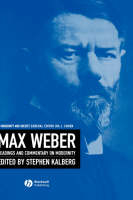
Max Weber
Wiley-Blackwell (Verlag)
978-0-631-21490-8 (ISBN)
This unique volume gathers Weber's writings on a broad array of themes, from the nature of work, to the political culture of democracy, to the uniqueness of the West, to the character of the family and race relations, to the role of science and the fate of ethical action in the modern world.
Gathers Weber’s writings in a comprehensive collection, organized by topic.
Rejuvenates a central, pivotal theme of Weberian thought: "How do we live?" and "How can we live in the industrial society?”
Connects Weber’s writings to contemporary issues through modern essays and editorial introductions.
Stephen Kalberg is Associate Professor of Sociology at Boston University and one of the world's leading Weber scholars. He is the author of Max Weber's Comparative Historical Sociology (1993) and translator and editor of a new edition of Weber's Protestant Ethic and the Spirit of Capitalism (Blackwell, 2001).
General Editor's Foreword. A Chronology of Max Weber's Life.
Glossary.
Acknowledgments.
Introduction: Max Weber: the Confrontation with Modernity.
Max Weber: the Person / Foundational Features of Weber's "Interpretive Understanding" / Sociology: its Aim and the Centrality of Subjective Meaning, the Four Types of Social Action, and Value-Freedom and Value-Relevance / Research Strategies and Procedures: Ideal Types, Model-Building, Societal Domains, and the "Locating" of Social Action / The Vision of "Society": Ideal Types, Societal Domains, Open Models, and the Interweaving of Past and Present / Weber's Multicausality: Social Carriers and Values / Modern Western Rationalism I: Weber's Model / Modern Western Rationalism II: Empirical Variation / Fears About the Future and Proposals for Social Change / Weber on Modernity and Weber's Sociology: An Assessment / A Note on Weber's Mode of Writing.
Part I: The Uniqueness of the West.
1 The "Rationalism" of Western Civilization.
Part II: The Uniqueness and Origins of the Modern Western Work Ethic.
2 The Religious Origins of the Vocational Calling: The Protestant Ethic and the Spirit of Capitalism.
3 Continuous Ethical Discipline: The Protestant Sects and the Spirit of Capitalism.
Part III: The Economy and the Specialized Nature of Work in the Modern Epoch.
4 Market and Planned Economies: Modern Capitalism's Substantive Conditions.
5 The Separation of the Worker from the Means of Production, the Spread of Officialdom, and Organizational Discipline in the Factory.
6 The "Cultivated Man" and the "Specialist": Certificates and the Origin of Ideas in Science.
7 Old and New Civilizations: Contrasting Rural Social Structures in Germany and.
the United States.
Part IV: Stratification and Inequality.
8 "The Distribution of Power Within the Group: Class, Status, Party".
9 Germany as a Nation of Commoners: "National Character and the Junkers".
10 The Counterbalancing of Economic and Social Inequality by Universal Suffrage.
Part V: Authority in the Modern Epoch: the Bureaucracy.
11 Power and Authority: When and Why Do People Obey?.
12 The Bureaucracy I: Formal Rationality, External Structure, Ethos, and Inequality.
13 The Bureaucracy II: the Impact Upon Society.
14 Past and Present: Charismatic Authority and its Routinization.
Part VI: The Nation, the Modern State, and Modern Law.
15 The Nation: A Sentiment of Solidarity and the "National" Idea.
16 The State, its Basic Functions, and the Economic Foundations of Imperialism.
17 From Particularistic Law to Formal Legal Equality and the Rights of Individuals.
Part VII: The Circumscription of Ethical Action Today and Weber's Response.
18 The Antagonism of the Economy and Political Domains to Ethical Action.
19 A "Casing of Bondage" and the Rule of Functionaries: the Call for Political Leadership, Strong Parliaments, and an Ethic of Responsibility.
Part VIII: The Political Culture of American Democracy: The Influence of the "Sect Spirit".
20 The Autonomy of the Individual in the Sect and the Capacity to Form Democratic Communities: Tolerance and Freedom of Conscience.
Part IX: On "Race," the Complexity of the Concept of Ethnicity, and Heredity.
21 On "Race" Membership, Common Ethnicity, and the "Ethnic Group".
Part X: The Meaning, Value and Ethical Neutrality of Science: "Science as a Vocation" and Other Writings.
22 The Meaning and Value of Science: Disenchantment, "Progress," and Civilized Man's Meaninglessness.
23 Ethical Neutrality in the Classroom and the Usefulness and Limits of an Empirical Science.
24 The Opposition of Salvation Religions to Science and Modern Culture.
Part XI: Modern Readings.
25 Private Authority and Work Habits: England and Russia.
Reinhard Bendix.
26 The Data Protection Act: A Case of Rationalization.
Martin Albrow.
27 The McDonaldization of Society.
George Ritzer.
28 Hitler's Charisma.
Luciano Cavalli.
29 The Routinization of Charisma: Rituals of Confession within Communities of Virtuosi.
Hans-Georg Riegl.
30 The Political Culture of American Democracy: The Enduring Influence of Religion.
Seymour Martin Lipset.
Bibliography.
Author Index.
Subject Index
| Erscheint lt. Verlag | 16.12.2004 |
|---|---|
| Verlagsort | Hoboken |
| Sprache | englisch |
| Maße | 152 x 229 mm |
| Gewicht | 735 g |
| Themenwelt | Geisteswissenschaften ► Philosophie |
| Sozialwissenschaften ► Soziologie | |
| ISBN-10 | 0-631-21490-9 / 0631214909 |
| ISBN-13 | 978-0-631-21490-8 / 9780631214908 |
| Zustand | Neuware |
| Haben Sie eine Frage zum Produkt? |
aus dem Bereich


